A Clinical Analysis Of Cloud's Psychology, Part I - Trauma, Dissociation, And Psychosis
A Clinical Analysis of Cloud's Psychology, Part I - Trauma, Dissociation, and Psychosis

This analysis was originally posted on Reddit, but I decided I wanted to archive it on this old blog too. This topic's been beaten to death already, but in light of the 25th anniversary stream and Rebirth trailer, I want to release my own take on Cloud's psychology using the lens of professional psychology. I'll cover a range of humanistic concepts and criteria from the DSM-5 (basically the bible of clinical psychiatric diagnosis) and tie them in with the lore of FFVII. Although the reasons for Cloud's identity crisis are well-known among OG fans, I'm interested in breaking down exactly why and how those factors resulted in his fabricated ex-SOLDIER persona within the context of real world psychology. I'm going to look into three main areas of exploration: trauma, identity, and reintegration. These areas will conceptualize how Cloud's experiences opened the gateway to pathology, how his understanding of himself is built and then shattered, and how the pieces come back together. This first post will cover the trauma piece, including the topics of dissociation and clinical diagnosis.
Part I - Trauma, Dissociation, and Psychosis [you are here] Part II - Identity, Self-Concept, and Mako Part III - Reintegration and Unconditional Love
One of the most common misperceptions about trauma is that any adverse experience will cause it. While it's true that adversity can cause stress, this belief undermines the remarkable resilience that humans have. The most important thing to consider is that everyone has resilience and the capacity for coping, but this differs from person to person. In the clinical context, traumatic experiences are defined as frightening, dangerous, or violent experiences that elicit strong emotions and physical reactions. People can also experience trauma by witnessing an event that threatens the life or physical security of a loved one (i.e. watching a parent die). When the stressfulness of a traumatic event exceeds a person's ability to cope, the stress becomes pathological and can be classified as trauma. The tragedy of Cloud's life is that his traumatic experiences are deeply stressful and essentially occurred back to back. Each event ticks off multiple boxes for the likelihood of trauma, and then Cloud essentially experienced them in succession, if we assume that his sense of time in Hojo's laboratory was warped due to catatonia.
Dissociation
Different people have different reactions to the same traumatic experiences, and the ex-SOLDIER persona is a unique one. Although we know Cloud's ex-SOLDIER persona is his primary consequence, there's a clinical way to contextualize what purpose it serves. Cloud's headaches are used as a constant indicator that something isn't right with him. His headaches are even described in the FFVII Remake Ultimania within his character profile (translation provided by aitaikimochi):
Cloud suffers from sudden headaches that last for brief moments. This pain is usually accompanied by flashes of his childhood, his fated opponent Sephiroth, or pieces of his past. There are times when visions of the future get mixed up as well. His headaches are filled with mysteries. Perhaps there might be more than one cause of these headaches that plague him...?
Aside from serving as narrative hints, the headaches are also connected to experiences of dissociation. Dissociation is a common consequence of trauma that center around a detachment from reality as a defense mechanism. It has numerous features, some of which open the gateway to psychosis. Let's focus on the specific features that are integrated into Cloud's story.
Memory
Memory is the largest piece of Cloud's dissociation since his ex-SOLDIER persona requires him to ignore key memories. At the start of FFVII, Cloud experienced problems with remembering anything between the Nibelheim incident and his arrival in Midgar. You could argue that Cloud has selective retrograde amnesia, but his memory between the time he left Nibelheim to join SOLDIER and the Nibelheim incident is deeply distorted, rather than unclear or largely missing. This hints to us that Cloud's memory problems are a function of dissociation, which is commonly invoked in trauma victims to protect them from memories of their traumatic experiences. Cloud's case is more complex though, since he also experiences identity problems. Even though sense of identity is also a feature of dissociation, we'll talk about it later in Part II.
Hearing voices
Hearing voices can be considered a part of dissociation when the voices are internal, or inside the head. It's when they are external and appear to be coming from outside the body that we begin to think of psychosis. This is where fantasy starts to blur how we can interpret Cloud's psychology. Cloud mainly hears two different types of voices during his journey: Sephiroth's voice, and his own voice. Cloud hears Sephiroth's voice taunting him from time to time, and it is an external voice. However, it's important to recognize that Sephiroth is a true external influence with his own agenda. Therefore, we can assume that it really is Sephiroth speaking to Cloud, not just a fabrication of Sephiroth in Cloud's head. We know this because when he experiences a headache, Sephiroth's voice often comes after. Basically, the more unstable Cloud's identity becomes, the more he mentally vulnerable he is and the more he hears Sephiroth's voice.
The other voice, Cloud's own voice, is internal. The problem is, sometimes it's tricky to tell whether it is functioning as dissociation or as a storytelling device. The key to understanding this is recognizing that this internal voice is meant to represent Cloud's real self. Cloud's identity crisis is the core of his pathology and is portrayed as a suppression of his real self. The times when he does hear his real self appear to be moments of clarity. In this case, the voice of Cloud's real self is understood as a sign of deconstructed identity; this voice is a manifestation of dissociation.
Intense Flashbacks
Intense flashbacks are another common feature of dissociation. Again, our perception of this concept in Cloud is somewhat unclear due to the fact that flashbacks are also a storytelling mechanism. However, we can use Cloud's headaches as an indicator of whether he is recalling a memory voluntarily or involuntarily. Cloud's involuntary flashbacks are shown to be disruptive and disorienting. They will initiate sometimes due to triggers in the environment, but might also occur out of the blue. Again, these flashbacks largely tie back to Cloud's identity crisis, so it's safe to say that this is another feature of his dissociation.
Reality Testing
Reality testing refers to a person's ability to understand and distinguish the external and internal world, or reality and fantasy. When someone has problems with reality testing, he experiences hallucinations. For the most part, Cloud is able to grasp his reality and navigate the environment just fine. It's either when something in the environment triggers Cloud's memories or when Sephiroth reaches out to him that he experiences intense hallucinations, which are indeed moments of dissociation. Again though, it's sometimes hard to tell if these are fabrications of Cloud's mind or if they are purposeful illusions created by Sephiroth, especially since other party members can sometimes see Sephiroth as well. But, even though there are moments where Cloud seems to have trouble distinguishing reality from his imagination, these moments are better explained by Sephiroth's influence. Therefore, I wouldn't say that Cloud's hallucinations are a sign of psychosis.
The other complicated piece here is the knowledge that the existence of Cloud's ex-SOLDIER persona is an inherent rejection of reality. Essentially, the ex-SOLDIER persona is like a delusion, a fixed belief that is resistant to change even with the presence of conflicting evidence. Cloud has to reject the reality of who he is, what happened to him, and Zack's existence in order to keep himself grounded. This is maybe subject to change now in Rebirth, but as far as the original story goes, Cloud begins to doubt himself once he is told that his memories actually belong to another person he can't remember. So, should we still talk about psychosis?

Real World Disorders
Before we proceed, a disclaimer. I do have professional training in clinical diagnosis and psychotherapy, but ultimately I'm still playing armchair psychologist. This is just my personal take on Cloud's psychology.
When I talk about psychosis, this refers to a remarkable disconnect from reality (see the NIH). Psychotic episodes can involved disturbed thoughts and difficulty with understanding what is real and what is not. It seems appropriate to discuss psychosis in Cloud's case given that his dissociation does make us question his understanding of reality around him, including what he remembers.
One of the most common things that I've seen people speculate is Dissociative Identity Disorder (DID) due to the implication of the ex-SOLDIER persona as a distinct personality. DID was formerly called Multiple Personalities Disorder, and it's pretty much what it sounds like. The key feature of DID is the presence of two or more distinct personalities that alternate in the conscious. Most of the the time, each personality (or alter, as it's often called) is unaware of what the others are doing when they have control of the conscious. See Marvel's Moon Knight for an excellent recent portrayal of DID. There's a lot of dispute about what causes DID, but the general consensus is that DID results from the combination of childhood trauma, mostly abuse or neglect. To best explain it: "in DID, traumatic memories are decontextualized and processed to retain internal and external balance, which leads to formation of alter personality states each with a sense self and agency, personal history, and a mission" (Şar, 2014).
Despite this, I'd argue we cannot say that Cloud has DID as we understand it in the real world for several reasons. The most important aspect is that Cloud doesn't consistently switch between his ex-SOLDIER persona and his real self - in fact, his real self rarely if ever comes out explicitly. Rather, it looks like as long as the ex-SOLDIER exists, the real self is suppressed. This specifically tells us that Cloud's experiencing an identity issue. Furthermore, people with DID present remarkable problems with reality testing regardless of external influences. The times that Cloud sees and hears Sephiroth are arguably still partly hallucinations, but we already established that Sephiroth is deliberately messing with Cloud's sense of reality and identity in some form. He's purposefully taunting Cloud, especially when others cannot see him. We know that Sephiroth is literally reaching out to Cloud, that this isn't all happening inside Cloud's head. Therefore, Cloud's hallucinations are likely not a sign of psychosis, and it's unclear if we can even call them hallucinations in the first place.
If I had to give an armchair DSM-5 diagnosis to Cloud, I would suggest that he has Delusional Disorder. This disorder shares some features with Schizophrenia, but does not include hallucination as a symptom. More importantly, delusional disorder doesn't feature "bizarre or odd behavior" that's often seen in other psychotic disorders. Outwardly, people with delusional disorder don't appear delusional unless the subject of the delusion is involved. I do still hesitate with this diagnosis though, mainly because Cloud ultimately does respond to information that challenges his delusion. The DSM-V does specify that "individuals with delusional disorder may be able to factually describe that others view their beliefs as irrational but are unable to accept this themselves." When Cloud is explicitly confronted with information that is inconsistent with his delusion, this in fact opens the gate for Sephiroth to convince him that he is essentially not real. If he had delusional disorder, Cloud would have continued to reject reality.
The fact of the matter is that Cloud's ex-SOLDIER persona cannot be fully understood in the context of real world psychosis. The fantasy elements of FFVII complicate diagnosis, especially considering when and how the ex-SOLDIER persona was born. Plus, I wouldn't pathologize Cloud this far given that I don't think real world psychosis best explains what happens to him. While Cloud's ex-SOLDIER persona appears to be a delusion, it doesn't present negative consequences unless he's presented with conflicting information and is vulnerable to change when challenged. Essentially, we can partly understand the ex-SOLDIER persona as an ongoing dissociation that serves to protect Cloud from the memories of traumatic experiences. But, I wouldn't go so far as to give him a DSM-5 diagnosis.
Basically, we can't fully conceptualize Cloud within the realm of psychosis or personality disorders. Rather, his dilemma revolves around the deconstruction of his identity, which I'll discuss in my next post.
More Posts from Terra-fatalis and Others
Crisis Core Transcripts
The long awaited (??? by me) master post of links to the Crisis Core (2007) transcripts. This bs was typed up by hand by yours truly because SOMEONE made UMDs very difficult to rip (<3 u SONY).
Link to gdrive folders hosting transcript documents.
Link to my fancy dedicated tumblr page for this nonsense because I can't not go overboard?? (it is maybe a convenient place to bookmark)
Check below the fold for direct links to specific content.
Complete Transcript ( Abridged / Unabridged )
00. Prologue
01. Embrace Your Dreams ( Abridged / Unabridged )
02. Betrayal ( Abridged / Unabridged )
03. Monster ( Abridged / Unabridged )
04. An Angel's Dream ( Abridged / Unabridged )
05. Where Are You? ( Abridged / Unabridged )
06. Protect Your Honor ( Abridged / Unabridged )
07. Departure ( Abridged / Unabridged )
08. See You Soon ( Abridged / Unabridged )
09. Escape the Nightmare ( Abridged / Unabridged )
10. Heroes ( Abridged / Unabridged )
Credits
DMW Scenes
Yuffie Missions
Other Missions
FFVII Remake Easter Eggs and compilation continuity - Part 4: DIRGE OF CERBERUS
[Includes: DoC Online Multiplayer - DoC - DoC Lost Episode]

SHINRA’S DARKEST SECRET
In Chapter 3, Weimar tells Cloud and Tifa of the rumors about undregroud secret labs. In Chapter 13, after the plate fall, Cloud, Barret and Tifa enter this mysterious underground facility full of monsters and Mako tanks.
7R: There’s a crazy story about a Shinra research lab hidden right beneath our feet - under the slums.
DoC: Deepground soldiers. (...) The shadow of the Shinra company, constructed by the former president and completely hidden from the rest of the world. (...) His goal was to create an army of superhuman warriors - not once letting morality interfere.


INTERMISSION
During Intermission it is not only confirmed the existence of Deepground but Yuffie and Sonon fight against some soldiers in their DoC uniforms.
Nero: "Team"? Fool. There are no "teams" in Deepground.
Yuffie: Deep...ground?
Nero: The place where my brother and I like to play.

WEISS AND NERO
After getting to Deepground Yuffie and Sonon had to fight against one of the Deepground Tsviets, Nero. Meanwhile Weiss was added as a boss fight in the Shinra Combat Simulator.

VITUAL REALITY
The overall concept of Shinra using VR simulators comes from DoC. In particoular, in DoC Multiplayer SOLDIERs and Tsviets used to train exclusively in VR arenas.

MOOGLE YUFFIE
During the first half of Intermission Yuffie wears a tattered cloak with a moogle hood. This piece of clothing appeared for the first time in Dirge of Cerberus.

I've been thinking about Sephiroth's having a tendency in Ever Crisis First Soldier to put his hand on his chest and that it seems to have made it into Rebirth as something he does.
The revelation that he used to wear a locket with his mothers picture there really does change the gesture meaning. I think he's reaching for for that. The idea he's still reaching for her roughly a decade after losing the locket really breaks my heart.
1/3 Compliments for your posts, I totally agree. If that, to some extent, is a common tendency of every fandom, it can be said that FFVII one is overly crazy. Zack is another good example of how people try to force the most desperate excuses to deprive a character of its importance because they don't like the consequences of his role.
2/3 "He's just an NPC with insignificant screetime! His scenes are even optional!" So why SE decided to make him the protagonist of a standalone game of the compilation? How can it even be labelled as fan service if he is so irrelevant in the first place? It doesn't take much to realize that without Zack FFVII can't even start in the first place, but before Remake a consistent part of fans even denied CC canonicity. And some are still not convinced.
3/3 It's funny because I've never seen anyone complaining about Cid's behaviour toward Shera but tons of scenes and quotes taken out of context to prove that Zack, Tifa or Aerith are mean characters and should be cut out of the picture. That's pretty self-explanatory of how much people tend to insert themselves in one of the two romantic sub-plots and take it personally, ignoring that neither is the core of the story but they both play a role in the plot. SE really has a tough nut to crack!
They most certainly do, and I would like to believe they aren't taking into consideration all this ridiculous discourse, and just concentrate on their writing. Maybe it helps that, at least from my observation, the JPN side of the fandom doesn't go on about the same stuff we do—at least from these extreme angles.
Zack is another interesting one, and at that point I'd have to have someone define what they exactly mean by "fan-service". The way people view this too, can be strange. Saying Zack was a plot device in the first OG is pretty accurate role-wise, despite being an important one, and I always considered CC to be for the purpose of making up for his characterization by digging into who he was and what his story did for the series. Pretty standard prequel, in this way, with the creative freedom to add more layers not previously known. This is...pretty typical for many franchises. I always felt like, CC is what would've been reminiscent in the OG if the issues of his late development (as a character) and focus in the story had more time. No matter if someone likes it or not, the objective understanding still comes from recognizing its place in continuity and the impact it has on the wider narrative of FFVII—Zack's character literally is written to do this. It's just storytelling. Something that does this is no more fan-service than anything else that's created for an audience and actually has an importance to the story. If CC is fan-service, so is OG, AC (or the separate Complete version), or the Remake. Even if you find it "unnecessary", Zack's character and his story don't abide by this connotation.
Which like, that starts a conversation on the whole "need" ideal that fans have about supplemental materials or extended storytelling, which sort of connects to this based on the "This character or story isn't needed for THIS story!". The issue being that, I think a person's "point of refence" of necessity is off—what they're basing the need for and to. Zack, and all the previously mentioned posts for Tifa, Kairi, Kristoff, etc.—it's like I said, someone an just have a perspective that can write off characters, but that's literally just changing the story, and coming from a point of reference that is just off.
We shouldn't always base an entries "need" in totality only from a reference point of a previous work. This just doesn't always equate to the value of said entry. Any sequel that isn't following a cliffhanger of its predecessor can be deemed "unnecessary" then, by this logic, but obviously it would be beyond trivial to mark any story that continues to extend the storytelling of a world and its characters as this for....what, exactly? To just put it down? The funny thing about CC, is that it IS necessary if your intention is to understand more about that missing slate of the story and to understand Zack's character in more depth.

responsible adults
A question about Kingdom Hearts, but can be for other stuff too. Do you think some important context or subtext is lost in the translation process from Japanese to a second language, even if it's translated to the best of a translator's ability, and if so, do you prefer a more literal translation over an official dub?
Hello! Thanks for the ask.
To answer the first question, there's different points to be made given the case by case nature of the topic. Important or simply interesting (these are not the same thing) information absolutely can be lost in the process of translation, but there's a lot of things fans need to understand:
Per discussion, is it actually lost, whether in the specific line or that of the overall context elsewhere?
Is the meaning actually *important* or imperative for understanding context [subtext]?
If lost, is it something that could've been localized creatively within the limitations of its presentation (voice acting/lip-sync, text space, etc.)?
Was it something that couldn't even be translated literally within the corresponding localized language? And/or did it not naturally flow into the writing of the actual scene itself for the given language?
Keep in mind that some interesting nuances built within a language system is really tailored for THAT language, and doesn't have to (or can't be) be transferred to another language smoothly in the production process of localization—if it's actually important, they might have to find a way, and chances are a literal translation may not even be enough to accomplish this. So to the second question—it isn't really “literal” vs localization for me, because whether one or both of these things can get the job done is circumstantial. Ultimately, what I care about most is whether what is written makes sense and can still be seen to retain what matters contextually (and sometimes, this means you can even get MORE or something more direct from a localization as opposed to “literal”). I’m using “ “ because really, you don’t want literal, for the majority of the text, it just doesn’t work that way as smoothly as people think. But I understand sometimes literal is actually “close to definition as possible” for people. (sometimes, indeed)
Anyway, if there is an issue with what's written, I know a "literal" translation doesn't always solve the inherent factors dependent upon the specific nature of the JPN language. The "literal" definition doesn't always fully capture how the Kanji is contextually used in the writing for another language. If I ever felt something was completely missed within a localization, my instinct is to first check the nature of the JPN and how it's written contextually to see how it fairs.
Of course, if it's information that isn't really based on the nature of the Kanji and how it's used, that it's something just being misunderstood in translation, then that isn't even a matter of whether it was literal or not—it was just wrong, and could've been right in any form if the text was understood (meaning, I'd take it literal or localized as long as the information is correct). In comparison to the amount of important storytelling text actually localized in video game projects, this doesn't nearly happen that often, though.
To look at Kingdom Hearts:
There have been many, many examples, especially between #1 and #2 discussed within fandom over the last 20 years. lol The majority is very miniscule and inconsequential (if even non-existent of a difference with proper understanding)—in KH3 I tend to think of some scenes between Sora and Kairi that has been discussed. @phoenix-downer has some excellent JPN/ENG comparisons of Sora and Kairi's Paopu Fruit and Light in the Darkness scenes (plus more) that serve some examples—Phoenix might be more readily able to remember some things over the years than I. There’s also this line from Xemnas about finding the Ancient Keybladers in KH3—this one can reasonably create a misunderstanding, but at the same time we don’t exactly have all the information at this point in time anyway.
One thing I do tend to think of is the scene between Aqua/Terra/Ven and the Disney Passes—where the term hogosha 保護者 (guardian, protector, patron, parent) is used in JPN, while in ENG it was written as "grown ups". There's a subtext here that has been missed by some ENG speakers. Similar to #4 (about literal translations), this is one of those cases where contextually speaking, the ENG went with what made sense for the scene and all factors corresponding to it, while still retaining something similar to the concept context-wise. As you can see based on the definition, the term hogosha is very flexible in use due to its span of multiple different words, but in its usage, it always has the connotation of something "parental". But, translating it as straight up "parent(s)" doesn't always work because of the nuances of the word. e.g. From FFXIII, Lightning is a hogosha to Serah, but this isn't to say that Lightning is literally her parent/mom—the contextual nature of hogosha tells more than this but with the same connotation. Sometimes it can be directly "parents/legal guardians", like how it's used to refer to what is essentially PTA school meetings (hogoshakai 保護者会). There's a reason why hogosha is distinct from just more direct words for parent (like oya 親 or ryoushin 両親).
This flexible nuance isn't readily and neatly packaged in a single word in ENG, however, and while, say, “guardian” [parental] can fit in some situations on its own, the connotation of parental isn’t so readily available like it is for hogosha alone. (A good example is this post I made) So, contextually there are other ways to capture it, and that may have to be with a non-literal translation. But, its meaning was missed by some ENG speaking fans, so when they hear "Aqua and Terra are like parents to Ven", they have no idea where that's coming from. Of course, some people were able to understand how this is carried contextually by the word "grown ups" and the situation of the Disney Passes—otherwise, some people completely missed that parental nuance, which would be significant of representing the relationship between Aqua/Terra to Ven.
Sometimes it isn't a localization issue, but a perception one.
With that being said, if in the case of other fandoms/series? It's all over the place. I've seen it all, between something being lost (important or just interesting [unimportant]), something being a mistranslation, or something being retained and people are honestly just trippin' because of misunderstanding things. Straight up. #4 (literal translation/context issues) happens a lot, in that case.
For example, recently I made this post and a follow up post about functionalities of JPN pronouns for (I, me) and the differences that lay there—there's also an extra layer I think I didn't include, which is that between using a specific pronoun in the form of hiragana/kanji/katakana, sometimes it's a stylistic choice as well. (Don't worry about this if you're confused lol). Point is, in this situation I also talked about how this was something that only applies for the JPN language and not necessarily others (especially ENG).
But again, a lot of this is case by case and we'd have to consider the #1-4 above, and for me, I know that to get the job done, it doesn't even have to be literal in order for this to happen.
As an extra note, fans REALLY need to understand localization, if even for SE specifically, to really talk about it efficiently. A lot don’t, and don’t care to. There is a sea of information to gather to form a perspective, and if they had this information, it’d change what they think about the “changes” a localization will make. One of the most blunt translators I can think of (Tom Slattery) gave this thought towards this very topic, and it’s just the tip of the iceberg. So I’ll leave it with this:
Vocal fans on the internet often complain about translators "changing" things in the English versions of games. This always amuses me, as we're very often working alongside the team to help name those things in the first place. For example, on Final Fantasy XIII, we were asked to help with the naming of the roles--Medic, Synergist, Ravager, and so on. We were intending to use different names in Japan and the US/EU from the start, and we (the English translators) brainstormed and proposed both sets. For the Japanese version, they needed English words that (A) sounded cool when rendered into Japanese, and (B) would be understood by non-English-speaking Japanese players, so we worked with the writers to come up with a set of consistent-sounding terms that met those criteria. For the localized version, our focus was on creating names that would have a more sci-fi feel to a native speaker's ear, and also abbreviate to three letters in a way that looked natural and made the short forms quickly and easily distinguishable from one another. We didn't "change" anything; we just generated two different sets of names for two different audiences.
Retroactive integration of the English translation into the Japanese version happens on projects quite often as well. For example, we were asked to come up with a translation for the names of the transporters in the Nautilus theme park. The Japanese name at the time was not something that really worked for us, so we went with "Nautilift." A few weeks later, that started popping up in the Japanese script. That kind of thing is always a huge compliment. It's a collaborative process. No one is going out stomping all over each other's work just for the heck of it.
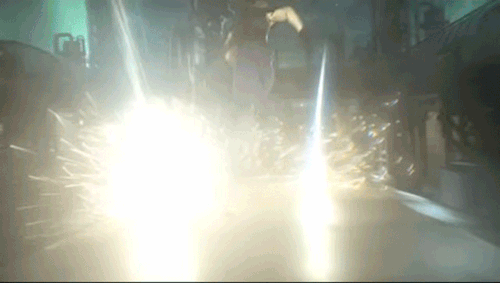
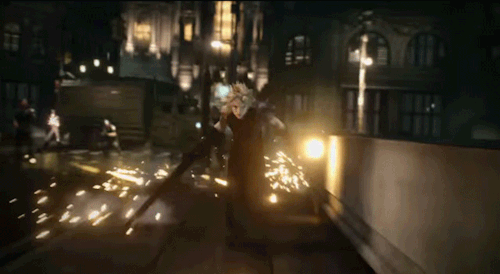
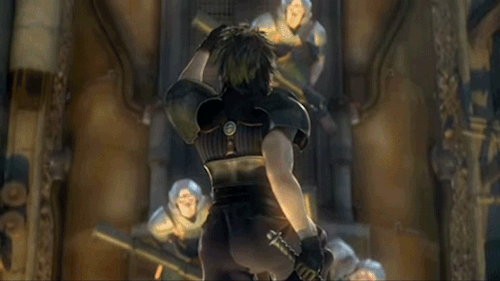
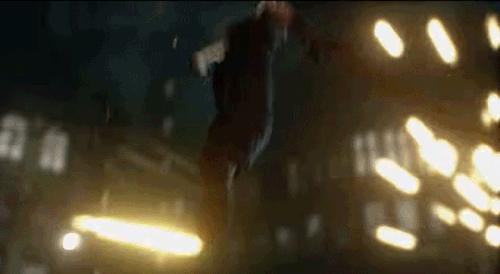
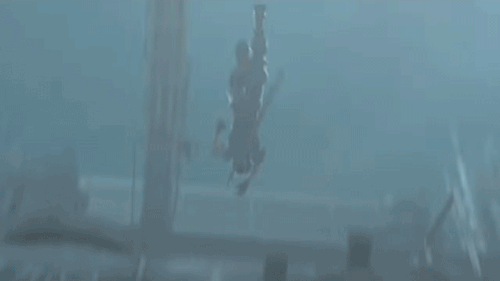
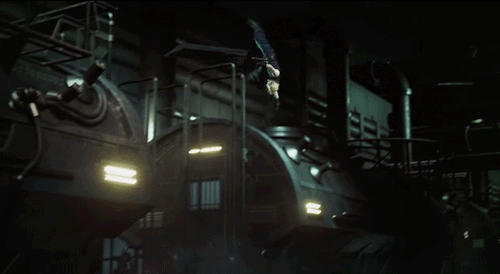
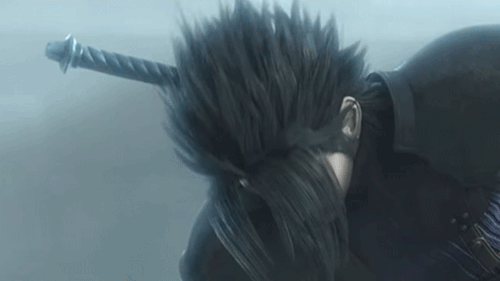
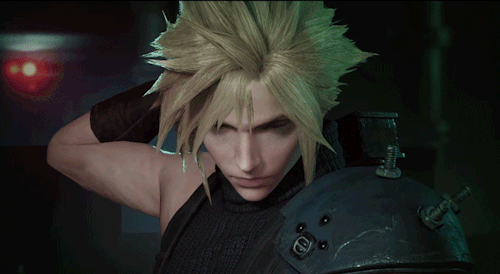
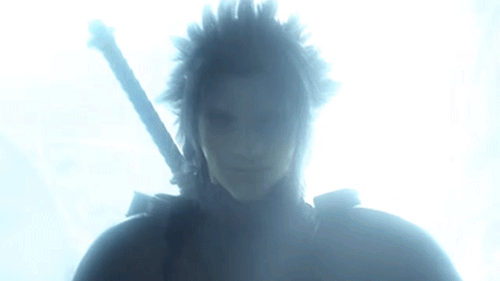
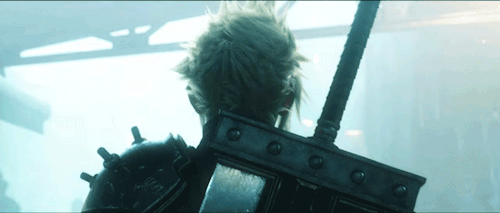
Zack and Cloud parallels
Crisis Core vs. Final Fantasy VII Remake

I could cry😭🎉🎊
Grazie grazie grazieeeeeeee 💖💖💖☄️☄️☄️
FFVII Remake Easter eggs and compilation continuity - Part 1: BEFORE CRISIS

AVALANCHE!
In Chapter 4, a group of Avalanche members helps Cloud, Wedge and Biggs to fight against some Shinra troops. The design of their uniforms is the same of the BC Avalanche group.

ATTEMPT ON THE PRESIDENT
During Chapter 1, while Heidegger and President Shinra observe the attack to Reactor 1, Heidegger mentions an assassination attempt on the President. He might be referring to the episode that took place on 30th February (yes, 30) 0001 in Junon.
“These sewer rats appear to call themselves Avalanche, sir. We are currently investigating whether they belong to the same group that made the attempt on your life.”

LEAVING MIDGAR
In Chapter 8 Aerith tells Cloud she once tried to leave Midgar. This happened in BC, on 9th August 0002, but Avalanche tried to kidnap her before she could leave the slums.
“You know, I thought about leaving once... But...in the end, I couldn't.”

TIFA’S CAT
One of the side quests in Sector 7 includes the research of three cats. They’re white with a pink collar, like the cat Tifa had when she lived in Nibelheim.

HIDEOUT IN WUTAI
After blaming Avalanche for the tragedy in Sector 7, Shinra divulged rumors about their allegiance with Wutai. It was showed in BC that Avalanche established there their HQ since it was the only remaining anti-Shinra country of the world.
“The sky is falling and Avalanche is to blame! But wait! Did you know Wutai is the one funding their activities!? For all their claims about fighting for the slums...they're nothing more than pawns of Wutai”
This alliance is confirmed in Intermission with Yuffie and Sonon cooperating with Avalanche to infiltrate Shinra.
Sonon: Gotta admit, I'm surprised you agreed to work with us.
Nayo: We're just doing what we think is necessary...to build a brighter future. That's all there is to it.

RUFUS
It was established in Before Crisis that Rufus conspired against his father providing intel and financial support to Avalanche. In Itermission, when Zhijie was questioned by the Shinra guards, he made fun of them but actually said the truth when he confessed the informant was Rufus.
Officer: Now spill it! Who gave you that information!?
Zhijie: Oh, his name was something like...Heidegger? (...) Alright, alright, I'll tell you. It was Rufus. (...)...Or was it Hojo?
Moreover Scarlet started suspecting of the presence of a mole in Shinra, since Wutai knew about their secret military projects.
Yuffie: That's enough, Sonon. I got this. Alright, lady, out with it. Tell us where you're hiding the new materia. Don't play dumb now. We know you've been cooking up something super-powerful.
Scarlet: Well, well... Wutai must have some highly skilled intelligence operatives. That...or we have a mole in our midst.

ALLIANCE
It is shown since Chapter 16 that there’s a particoular link between Rufus and the Turks. Indeed in BC Tseng, Reno and Rude were sentenced to death by President but Rufus saved them in exchange for their loyalty.
“The VP needs us.”

FINAL BOSS
The Whisper Harbinger appearing in Chapter 18 bears similarities with Zirconiade:
- They both have to be faced at the end of the highway after entering a flashing portal

- The shape of the body of the Harbinger (just like Whispers Rubrum, Viridis and Croceo) shares some similarities with Zirconiade

- Both battles take place in an alternate dimension with shattered environment

- After their defeat they emit energy blasts and explode with a shockwave

- After the explosion, sparkling particles fall slowly from the sky, like snow

-
For the other parts refer to the masterpost
-
 merry--jelly liked this · 1 month ago
merry--jelly liked this · 1 month ago -
 myheartismadeofstars liked this · 1 month ago
myheartismadeofstars liked this · 1 month ago -
 relicvalley liked this · 3 months ago
relicvalley liked this · 3 months ago -
 chuunyaz liked this · 4 months ago
chuunyaz liked this · 4 months ago -
 icepandawarrior liked this · 5 months ago
icepandawarrior liked this · 5 months ago -
 hungrybaguette liked this · 7 months ago
hungrybaguette liked this · 7 months ago -
 whereforandthewhy reblogged this · 7 months ago
whereforandthewhy reblogged this · 7 months ago -
 greenwaterskeeter liked this · 8 months ago
greenwaterskeeter liked this · 8 months ago -
 astraylight liked this · 9 months ago
astraylight liked this · 9 months ago -
 mmccrell reblogged this · 10 months ago
mmccrell reblogged this · 10 months ago -
 mmccrell liked this · 10 months ago
mmccrell liked this · 10 months ago -
 bananacheese69 liked this · 10 months ago
bananacheese69 liked this · 10 months ago -
 whosmilk liked this · 11 months ago
whosmilk liked this · 11 months ago -
 enamiau liked this · 1 year ago
enamiau liked this · 1 year ago -
 skeettles liked this · 1 year ago
skeettles liked this · 1 year ago -
 tasteslikesugar liked this · 1 year ago
tasteslikesugar liked this · 1 year ago -
 lewstherintelescope liked this · 1 year ago
lewstherintelescope liked this · 1 year ago -
 ritaemma liked this · 1 year ago
ritaemma liked this · 1 year ago -
 akar3n liked this · 1 year ago
akar3n liked this · 1 year ago -
 honestlyraging reblogged this · 1 year ago
honestlyraging reblogged this · 1 year ago -
 honestlyraging liked this · 1 year ago
honestlyraging liked this · 1 year ago -
 hahligirl56 liked this · 1 year ago
hahligirl56 liked this · 1 year ago -
 daisy-stardust liked this · 1 year ago
daisy-stardust liked this · 1 year ago -
 acheronprince liked this · 1 year ago
acheronprince liked this · 1 year ago -
 mrsong11 liked this · 1 year ago
mrsong11 liked this · 1 year ago -
 atiny-1 liked this · 1 year ago
atiny-1 liked this · 1 year ago -
 redapplepie1188 liked this · 1 year ago
redapplepie1188 liked this · 1 year ago -
 ifcloudsblog reblogged this · 1 year ago
ifcloudsblog reblogged this · 1 year ago -
 slothinginorbit reblogged this · 1 year ago
slothinginorbit reblogged this · 1 year ago -
 slothinginorbit liked this · 1 year ago
slothinginorbit liked this · 1 year ago -
 sleepgalore liked this · 1 year ago
sleepgalore liked this · 1 year ago -
 wcivhy liked this · 1 year ago
wcivhy liked this · 1 year ago -
 brokenescence liked this · 1 year ago
brokenescence liked this · 1 year ago -
 asuna78877 liked this · 1 year ago
asuna78877 liked this · 1 year ago -
 disneygeeksora95 reblogged this · 2 years ago
disneygeeksora95 reblogged this · 2 years ago -
 disneygeeksora95 liked this · 2 years ago
disneygeeksora95 liked this · 2 years ago -
 xionthedragon liked this · 2 years ago
xionthedragon liked this · 2 years ago -
 figaoz reblogged this · 2 years ago
figaoz reblogged this · 2 years ago -
 nico-m521 liked this · 2 years ago
nico-m521 liked this · 2 years ago -
 kuro71 reblogged this · 2 years ago
kuro71 reblogged this · 2 years ago -
 kuro71 liked this · 2 years ago
kuro71 liked this · 2 years ago -
 hisnie liked this · 2 years ago
hisnie liked this · 2 years ago

Hardcore FFVII fan sharing theories & fanart, sometimes silly stuff ⋆ AuDHD ⋆ She/her ⋆ INTP ⋆ Atheist ⋆ Non-native English speaker, be merciful with my odd way of writing ⋆ Twitter @TerraFatalis
234 posts

